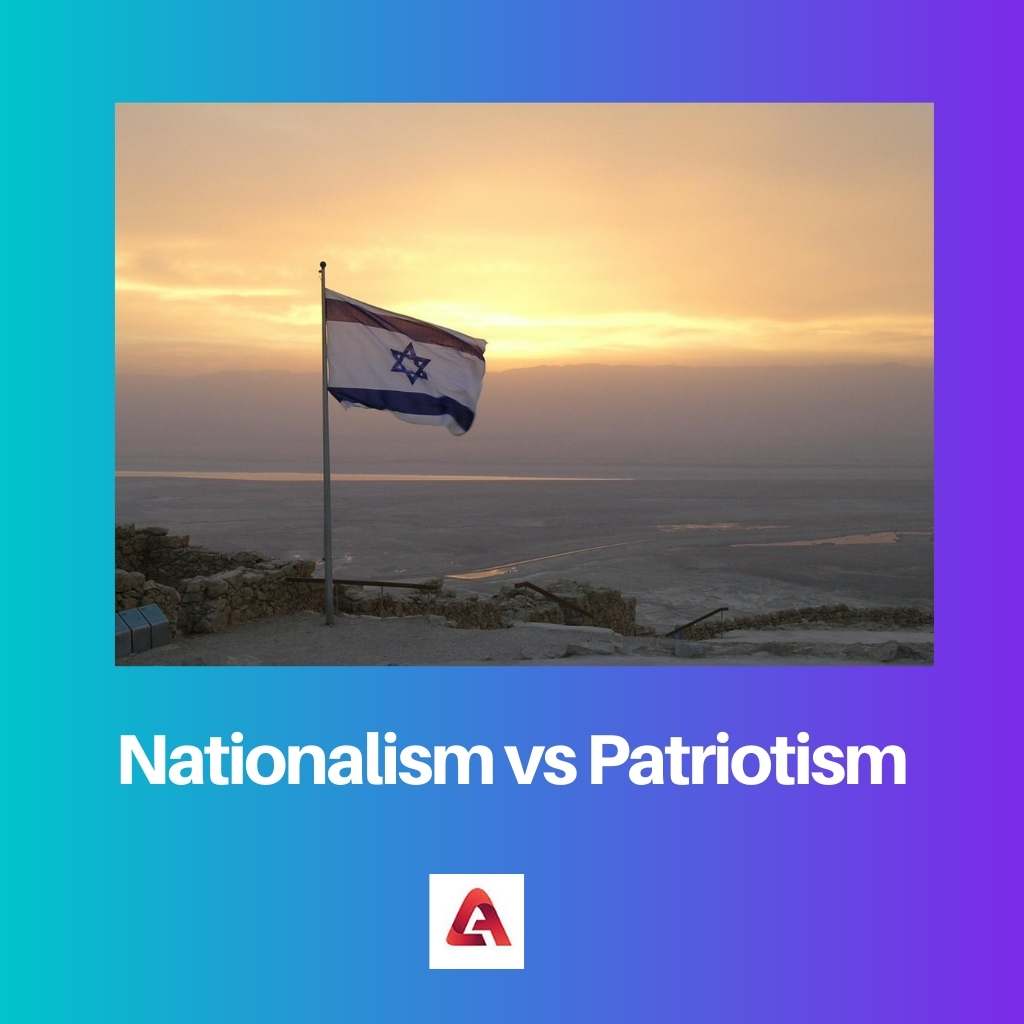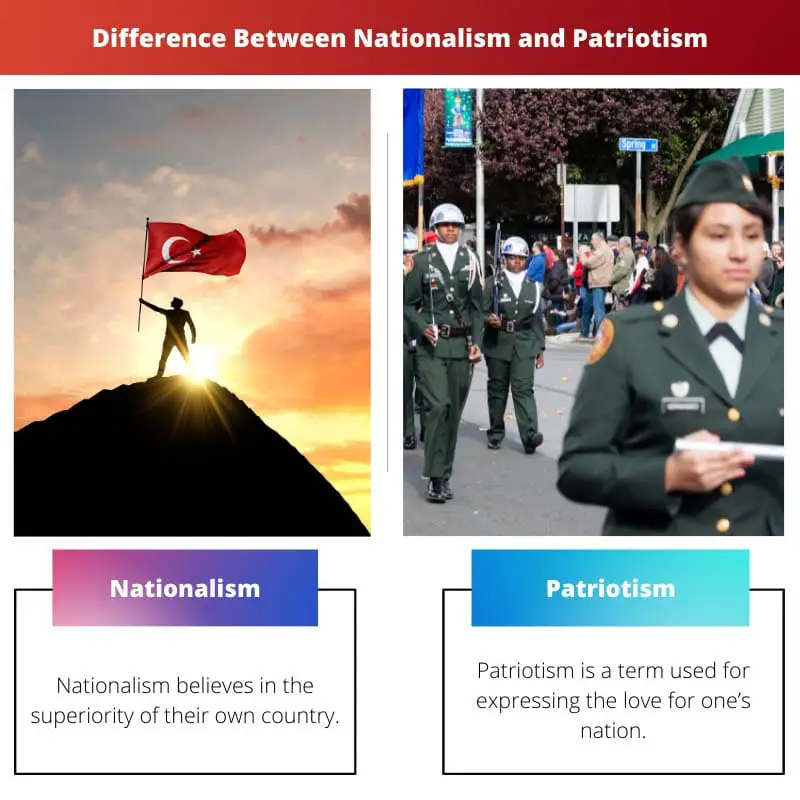Every human being is very much attached to his or her motherland. Both the terms nationalism and patriotism incline towards the love of the country but in different aspects. So confusion may arise between the two terms. But with proper observations, a lot of differences will arise between the two terms.
Key Takeaways
- Nationalism involves strong identification with one’s nation, asserting superiority over other nations, while patriotism represents love and pride for one’s country without denigrating others.
- Nationalism can lead to aggressive foreign policies and conflict, whereas patriotism fosters unity and constructive criticism within a nation.
- Nationalism promotes and preserves national identity and culture, while patriotism emphasizes loyalty and devotion to one’s country without excluding other cultures.
Nationalism vs Patriotism
Nationalism is a term that comes from the word ‘nation’ and is used to describe the belief that your country is superior to other countries. Nationalists can sometimes become violent. Patriotism is used to describe the love for one’s nation, and it is mostly peaceful with no violence involved.

Nationalism believes that people of the country are equal, and idealogy believes in unity. It also believes in the superiority of its country compared to all other countries. The word nationalism has arrived from the word “Nation”, meaning country. It can also be said that nationalism is how much an individual is proud of his/her country.
The word Patriotism originated in the 18th century, it came from the word patriot. The word patriot has its origin in the Greek word “patēr”, which means fatherland. Patriotism is a term used to express love for one’s nation and protect the country from any negative influence and people who want to harm the country.
Comparison Table
| Parameters Of Comparison | Nationalism | Patriotism |
|---|---|---|
| Definition | Nationalism believes in the superiority of their own country. | Patriotism is a term used for expressing the love for one’s nation. |
| Classification | Nationalism can come in many various types like Ethnic nationalism, marginal nationalism, cultural nationalism, Civic Nationalism, and so on. | Patriotism doesn’t have any classification. |
| Terminology | The term Nationalism comes from the term “Nation”. | The word Patriotism originated from the Greek word “patēr”. |
| Aspects | Nationalism can sometimes become violent. | Patriotism is a peaceful idealogy with no violence. |
| Views | Nationalists believes that their nation is the best. | Patriotism respects all nations equally. |
What is Nationalism?
Nationalism is an ideology that makes a person believe in the superiority of their country or state. Nationalism can turn a bit violent as nationalists can turn a blind eye to any negative aspects of the country. Nationalism is intertwined with a country’s roots and cultures, and values.
Nationalism believes that people of the country are equal, and idealogy believes in unity. It also believes in the superiority of its country compared to all other countries. The word nationalism has arrived from the word “Nation”, meaning country. It can also be said that nationalism is how much an individual is proud of his/her country.
Nationalism can come in many various types like Ethnic nationalism, marginal nationalism, cultural nationalism, Civic Nationalism, and so on. Out of all the various aspects of nationalism, the most significant are ethnic nationalism, Cultural nationalism, and political nationalism. Ethnic nationalism demonstrates that the ethics of any country has been passed down through generations and has become the roots of the country’s identity. Cultural nationalism is nationalism when the country has the idealogy of a nationalist based on the cultures and virtues of the country. And lastly, Political nationalism is where one believes in a political idealogy that he or she thinks is the best suited and protects the country’s cultures and values.

What is Patriotism?
Patriotism is a term used to express love for one’s nation and protect the country from any negative influence and people who want to harm the country.
The phrase quickly conjures up the people who actively defend the country from outside enemies. For example, people in the military are considered the most patriotic for their heroic and life-threatening service of serving the country.
However, being in the military is not the only source of expressing patriotism. Patriotism comes in various forms, and many other professions can be patriotic, like all doctors, teacher, firefighters and other professionals providing their services for the country also count indirectly as patriotism, as their service uplifts the country and keeps the countrymen in a better condition. Patriotism doesn’t only remain in the country’s protection from the outside but also remains in the internal peace maintained in the country. Patriotism lies in every the smallest action, like paying taxes, respecting the constitution, believing in equality, respecting all, respecting the country and its’ cultures, and most importantly, being a responsible citizen.
The word originated in the 18th century and came from the word patriot. The word patriot has its origin in the Greek word “patēr”, which means fatherland.

Main Differences Between Nationalism and Patriotism
- Nationalism is how much an individual is proud of his/her country, whereas Patriotism is a term used for expressing love for one’s nation and protecting its country.
- The term Nationalism comes from the term “Nation” The word Patriotism originated from the Greek word “patēr”.
- Nationalism has a classification, whereas Patriotism has no classification.
- Nationalists may not take criticism of their nation, whereas Patriots accept criticism and believe in the country’s overall improvement.
- There are no professions that are considered Nationalist professions, but there are Professions that are considered to be patriotic.

- https://onlinelibrary.wiley.com/doi/abs/10.1111/0162-895X.00329
- https://journals.sagepub.com/doi/abs/10.1177/1368430211430518

The origins of the terms nationalism and patriotism, and how they have evolved over time, offer significant insights into understanding the core principles of each ideology.
The article explores the multifaceted nature of nationalism and patriotism, delving into various dimensions that define these two concepts.
The connection between patriotism and different professions, as well as their contributions to the country, is an intriguing aspect that broadens the scope of patriotism beyond mere sentiment and emotion.
By elucidating the key differences and viewpoints of nationalism and patriotism, this article offers valuable insights into the cultural, political, and social implications of these concepts.
Nationalism and patriotism have always been subjects of controversy and confusion. However, despite their differences, these two terms are both fueled by the love of one’s country.
The historical references and scholarly sources cited in the article lend academic rigor to the discussion on nationalism and patriotism, enriching the discourse with intellectual depth and authority.
The comparison table provided presents a clear distinction between nationalism and patriotism, explaining their differences and importance within a nation’s culture and identity.
The ideological and behavioral aspects of nationalism and patriotism are highlighted in great detail, shedding light on the potential consequences and benefits associated with each concept.
The comprehensive explanation of nationalism and patriotism provided in this article, along with the historical and etymological background, offers a well-rounded understanding of these two concepts.
The significance of nationalism and patriotism in shaping national identity and fostering unity, as well as the implications of these ideologies on foreign policies and societal harmony, are aptly explained.
The comprehensive comparison of nationalism and patriotism in terms of their origins, beliefs, and moral underpinnings enhances our understanding of these concepts and their relevance in contemporary society.
The nuanced explanation of the aspects and classifications of nationalism and patriotism adds depth to the discourse, highlighting the complexities and dynamics associated with these ideologies.